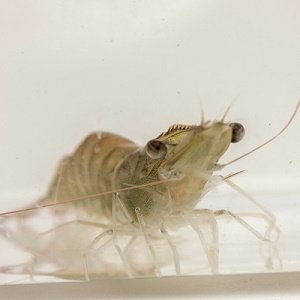
Shrimp producers face a constant battle against diseases, particularly those caused by bacteria like Vibrio parahaemolyticus. This unpleasant bacterium can wreak havoc on shrimp populations and lead to significant economic losses.
Researchers are exploring natural and cost-effective solutions to boost shrimp immunity and combat these diseases. In this regard, a team of scientists from Curtin University Malaysia, Universiti Malaysia Terengganu, Shantou University, and King Abdulaziz University studied the effect of Morinda citrifolia fruit extract on the immunity of Penaeus vannamei postlarvae (PL) against V. parahaemolyticus.
Disease Threatens Shrimp Boom
Intensive shrimp farming creates a breeding ground for viral or bacterial infections, resulting in devastating mortalities and losses worth billions of dollars.
One of these culprits is Acute Hepatopancreatic Necrosis Disease (AHPND), caused by a specific strain of bacteria (Vibrio parahaemolyticus) that targets young shrimp. This disease can wipe out entire populations within days, posing a significant threat to the shrimp industry.
Noni: A Natural Powerhouse
The recent study investigated the potential of Morinda citrifolia fruit extract, also known as “wild guava” and “devil’s fruit,” as a weapon against Vibrio parahaemolyticus in Penaeus vannamei shrimp postlarvae (PL).
Morinda citrifolia “noni” has a long history of use in traditional medicine. Research suggests that noni possesses antimicrobial properties and the ability to bolster the immune response in aquaculture species.
Studies have shown that noni possesses several beneficial properties, including:
- Antimicrobial activity: Noni extracts exhibit the ability to combat harmful bacteria like VPAHPND.
- Boosting the immune system: Noni can enhance shrimp immune response, making them more resistant to infections.
- Natural and eco-friendly: Unlike antibiotics, Noni is a natural product that avoids risks associated with chemical treatments.
The Science Behind the Solution
Researchers first identified active ingredients in the extract through Gas Chromatography-Mass Spectrometry (GC-MS). They then fed shrimp diets containing different concentrations of the extract for 30 days before exposing them to Vibrio parahaemolyticus bacteria, the cause of Acute Hepatopancreatic Necrosis Disease (AHPND).
The study revealed a total of 45 unique compounds, with cyclononasiloxane and octadecamethyl being the most abundant.
Stay Always Informed
Join our communities to instantly receive the most important news, reports, and analysis from the aquaculture industry.
Promising Results: Increased Survival and Better Health
The results were promising.
Shrimp fed with M. citrifolia extract had significantly higher survival rates compared to the control group after exposure to the bacteria. Interestingly, the highest survival rate was observed in shrimp fed with the highest concentration (50 mg/g) of the extract.
Boosting Immunity through Intestinal and Cellular Health
The study suggests that the extract’s efficacy could be related to its positive impact on shrimp health. The activity of some digestive enzymes and antioxidants, as well as the condition of hepatopancreatic cells, improved in shrimp fed with the extract. This indicates a potential enhancement of shrimp immune system and overall well-being.
A Sustainable Approach for the Shrimp Industry
This research highlights the potential of M. citrifolia extract as a natural and potentially cost-effective way to enhance shrimp immunity against Vibrio parahaemolyticus. This approach could benefit shrimp producers by reducing dependency on antibiotics and promoting a more sustainable aquaculture industry.
Conclusion
While these results are promising, further research is needed to fully understand the long-term effects of the extract and optimize its use in shrimp aquaculture. However, this study paves the way for natural solutions to play a more significant role in safeguarding shrimp health and combating vibriosis in the shrimp industry.
The study was funded by the Ministry of Higher Education, Malaysia, under the Higher Institution Centre of Excellence (HICoE) grant.
Contact
Victor Tosin Okomoda
Institute of Tropical Aquaculture and Fisheries, Universiti Malaysia Terengganu, 21030, Kuala Nerus, Terengganu, Malaysia
Email: okomodavictor@yahoo.com
Mhd Ikhwanuddin
Institute of Tropical Aquaculture and Fisheries, Universiti Malaysia Terengganu, 21030, Kuala Nerus, Terengganu, Malaysia
Email: ikhwanuddin@umt.edu.my
Reference (open access)
Moh, J. H., Okomoda, V. T., Mohamad, N., Waiho, K., Noorbaiduri, S., Sung, Y. Y., Manan, H., Fazhan, H., Ma, H., Abualreesh, M. H., & Ikhwanuddin, M. (2024). Morinda citrifolia fruit extract enhances the resistance of Penaeus vannamei to Vibrio parahaemolyticus infection. Scientific Reports, 14(1), 1-18. https://doi.org/10.1038/s41598-024-56173-4
Editor at the digital magazine AquaHoy. He holds a degree in Aquaculture Biology from the National University of Santa (UNS) and a Master’s degree in Science and Innovation Management from the Polytechnic University of Valencia, with postgraduate diplomas in Business Innovation and Innovation Management. He possesses extensive experience in the aquaculture and fisheries sector, having led the Fisheries Innovation Unit of the National Program for Innovation in Fisheries and Aquaculture (PNIPA). He has served as a senior consultant in technology watch, an innovation project formulator and advisor, and a lecturer at UNS. He is a member of the Peruvian College of Biologists and was recognized by the World Aquaculture Society (WAS) in 2016 for his contribution to aquaculture.







